Every year, more and more companies are seeing the benefits of hiring freelancers over employees.
In fact, up to 62% of companies are already hiring freelancers and aren’t stopping. With saving costs, faster deliverables, and a larger pool of talent to find specialized workers, it’s no wonder freelancing seems like the life to live.
Or is it?

Freelance writers are finding it more and more challenging having a sustainable living by writing for clients.
Brady Dinkel is a freelance writer and he uses his freelance income to cover his backpacking trips.
He soon realized that the freelance life is much harder than he thought.

“When I started freelance writing, I expected splendor and riches. I began freelance writing to save money for a backpacking trip with friends only to find out it was more challening than the internet made it out to be.”
To look at the REAL challenges new freelance writers are facing, let’s look at Freelancermap’s Freelancer Study.
In their study, they discuss the major challenges freelancers face, which can be a helpful roadmap for new freelance writers.
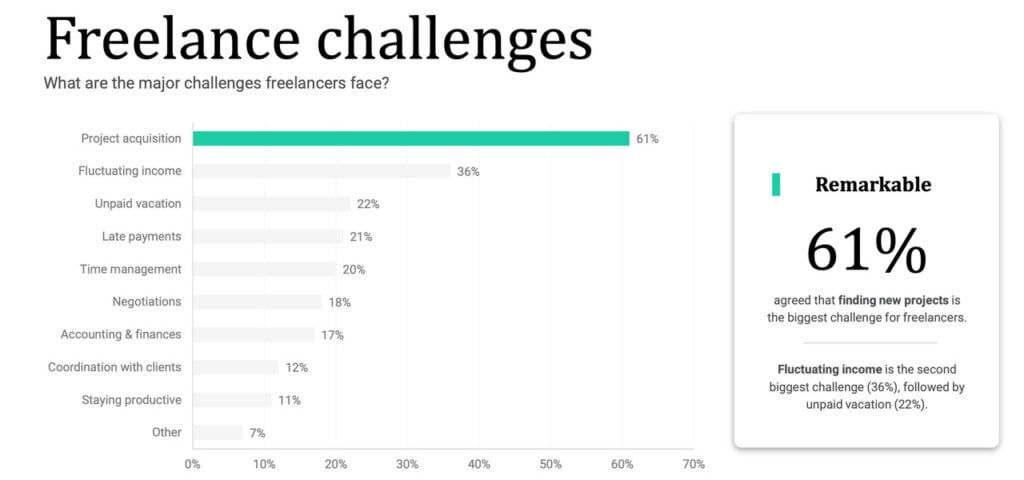
1. Project Acquisition

Can you believe project acquisition – the writing jobs you get – is more challenging than fluctuating income?
And it’s almost twice as challenging, too!
According to the study, the top three project acquisition challenges are:
- Project requests don’t match my skills (40%)
- Few recurring clients (38%)
- My network is not good enough (35%)
Let’s break this down.
Project Requests Don’t Match My Skills
When you’re new to freelance writing, you probably take any job that comes your way, right?
I mean, that’s what I did and that’s what I taught new writers to do (not anymore, though).
This tactic was to help new writers land writing gigs faster and help them acclimate to the freelance role.
But, nowadays, this isn’t the best strategy, especially when you’re hired to do a project that doesn’t match your skills.
For example, you pitch to a job ad wanting a copywriter to do an ad campaign.
*raises hand*
You think, “I’ve never done ads, but I’m a copywriter, and it can’t be that difficult.”
*nods, yes*
WRONG!
Instead of confidently telling the client you can do this work, let them know you haven’t done it but are willing to learn.
A while back, a marketing manager contacted me on LinkedIn and asked about my ad skills.
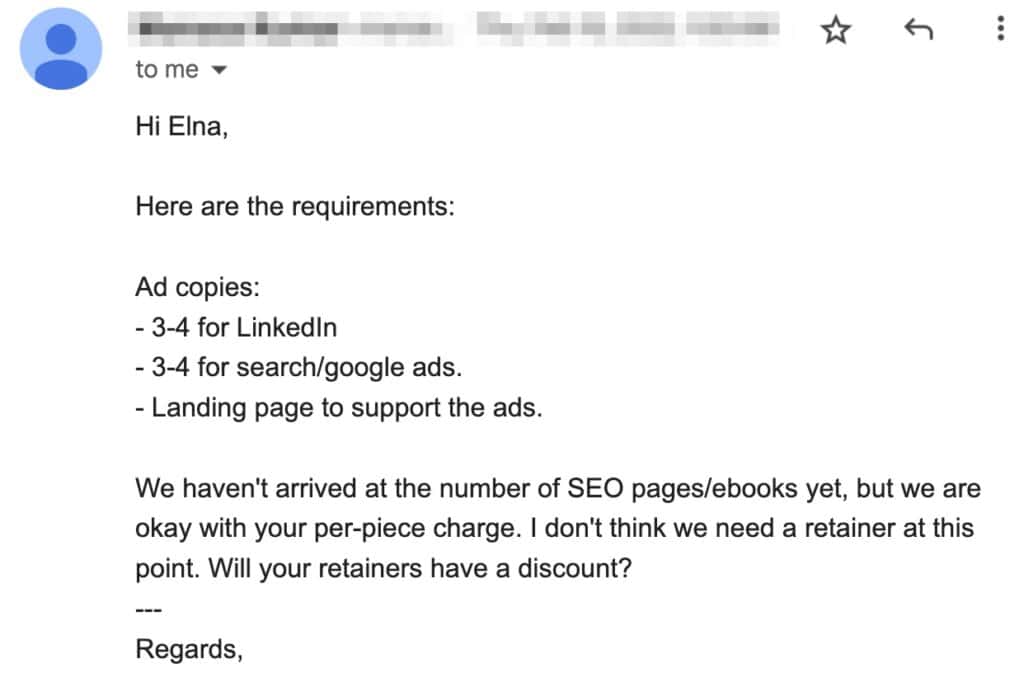
I have never done ads for LinkedIn, but I have done Facebook ads.
So, I told them the truth instead of lying and saying I was familiar with this project.
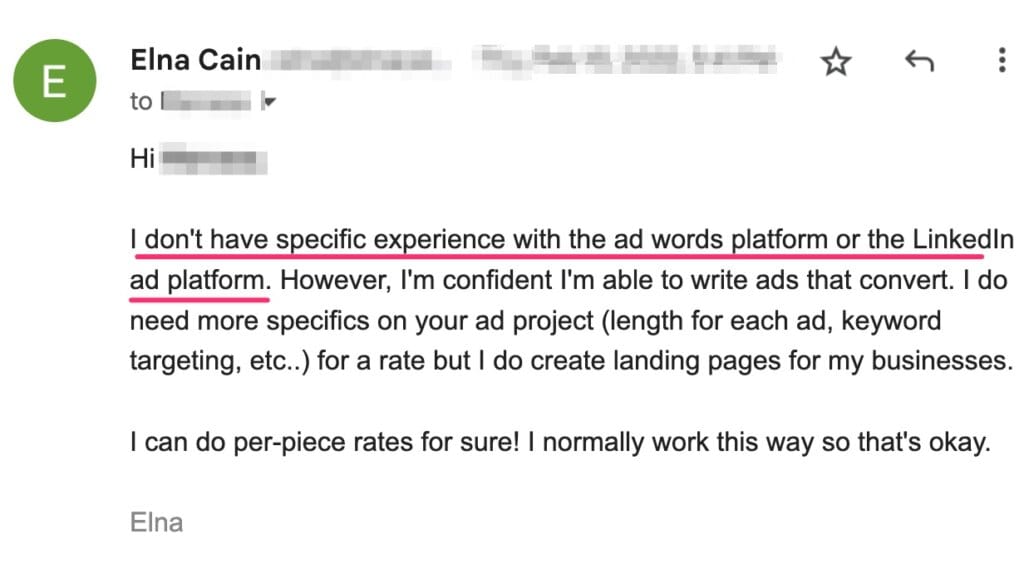
By being truthful, the client accepted what I said and hired me for their SEO campaign.
But if you see a job ad that requires you to do something you aren’t familiar with (e.g., using their CMS to format your articles and adding a meta description), don’t apply to those jobs OR state what you are familiar with and let them know you can learn what you don’t know.
Few Recurring Clients
This isn’t a challenge for only new freelancers!
I struggle with this as well.
For example, when I landed a cool writing job for an AI company, I was ecstatic to write for them.
I wrote my first article and the content lead was impressed, so he asked me for another article and then another.
But, after that? Nothing more.
I asked another writer for this client if that happened to them, too, and it did.
Some clients get ‘well-known’ writers to write a few posts and then move on.
What I thought was a recurring client, turned out to be a bait-and-switch client.
Now, I get nervous after my third article with a new client.
Fortunately, the editor on my recent writing gig connected with me on LinkedIn, so hopefully, that means I’m a long-term writer for them!
So, how can a new writer gain a long-term client that wants their writing every week or month?
My answer is to gain blogging jobs!
I normally take this type of content because it’s recurring and high-paying.
Many job boards have blogging jobs for new writers, so bookmark these sites for gigs.
My Network is Not Good Enough
Networking is a critical skill a freelance writer needs to have locked down to be successful.
If you feel your network isn’t good enough, it’s time to change that.
I want you to go to LinkedIn to find the right people to connect to.
This means finding:
- Editors
- Content leads
- CEO’s
- Communication managers
- Content strategists
- Content managers
Here are some of the recent connections I’ve made on LinkedIn.
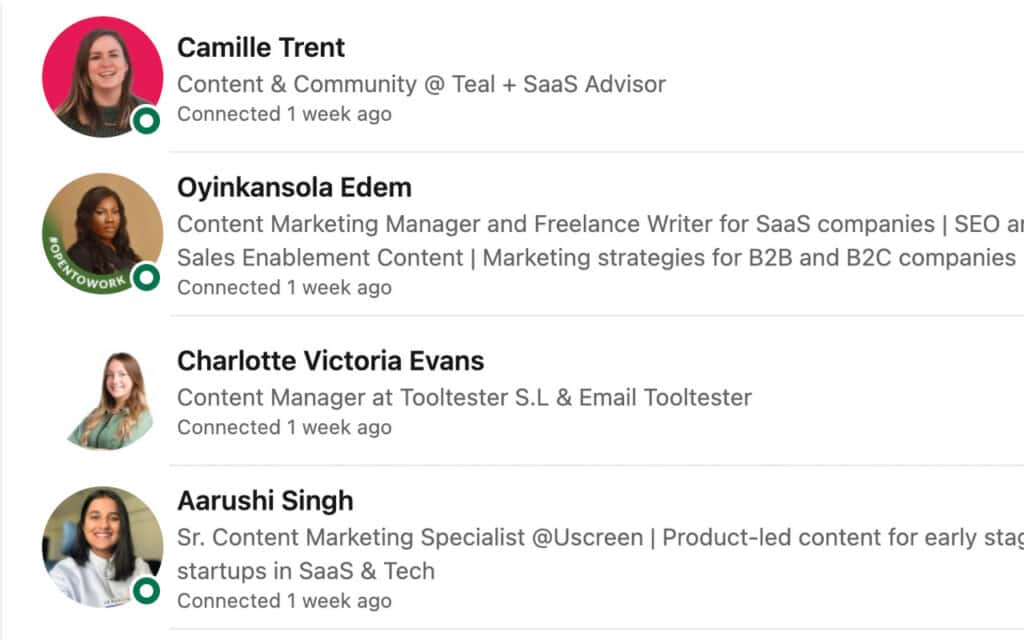
2. Fluctuating Income

This is a HUGE freelance writing challenge EVERY freelancer has.
You can bill thousands of dollars one month and then just hundreds the next.
Clients let go of writers or don’t commission any articles to you.
So, how do you account for this and prepare for this challenge?
What I would do is a couple of things:
- Offer different services
- Secure your anchor clients
- Have ad hoc clients
Let’s break this down.
Offer Different Services
As a content writer online, you can make a lot of money.
How? We offer services like copywriting, ad writing, sales page writing, virtual assistant, content strategist, and social media writer.
You can also offer different ‘services,’ such as owning niche websites, starting a YouTube channel or podcast, or creating digital products.
This is effectively going into the creator economy.
These services, roles, and businesses are based on CONTENT.
And as a freelance writer….well that’s your speciality!
If you want to build a content business arm from freelancing, check out my course Freelance Blogging in a Weekend.
Secure Your Anchor Clients
Anchor clients are the 2-3 clients you have who give you sustainable income every month. They are your ride-and-die clients who stand with you month after month, year after year.
Your anchor clients may fluctuate or change throughout the year, but you should aim for 2-3 that make up most of your income.
And while you may think, “But Elna, what happens if all of them let you go? Now you have no more anchor clients and no income. What now?”
While this MIGHT happen, it’s improbable. Sure, one or even two clients may let you go or decrease the amount of work you are doing, but along with having anchor clients, you also need to be hustling.
This means staying relevant on social media, networking, pitching, and connecting with the people who hire you.
Don’t ever become complacent with your anchor clients!
Have Ad Hoc Clients
Ad hoc clients are the clients that only commission articles on an as-needed basis.
I have two ad hoc clients. One asks me for copywriting work whenever they need it, and the other asks me for blog writing every quarter.
While these deliverables are few and far between, they are consistent clients that I have along with my anchor clients.
3. Unpaid Vacation

I’m surprised that unpaid vacation is a challenge for many freelancers.
I mean, being a freelancer means having the freedom to spend your day the way you want to.
You create the work by landing clients and managing your work so that you can have the afternoons free and don’t have to work on Mondays if you don’t want to!
I think for new freelance writers, the idea of unpaid vacation stems from the employer-employee framework.
There is no such thing as that when you freelance.
Instead, you are viewed as a collaborator or on par with the businesses hiring you.
I did NOT take a vacation for the first 3-4 years of freelance writing.
I mean, I took Christmas off, but not really.
I still wrote for clients or wrote for my blog.
But I mostly work at night, and that means I have my days free, so there wasn’t a need to ‘go on vacation.’
It wasn’t until my twins were old enough that I decided to take the summers off and do some road trips.

So, it IS possible to take extended vacation as a freelancer that is paid.
How?
By finishing your work earlier or getting the work you will ‘miss’ earlier to finish…or, work a bit on holiday!
Do what you want!
I personally am offline for my holidays as I work online for my job and need a digital diet.
You may not be able to do so in the first or second year, but eventually, you will have enough saved up or enough clients to take a few weeks off once or twice a year.
4. Late Payments
Late payments definitely suck as a freelancer and they can’t always be avoided.
Even after almost a decade of freelance writing, I still get the odd late payer.
But I’m okay with this because my clients are high-paying clients, and I know they will eventually pay me.
If I send an invoice and a week goes by, I will nudge and remind them, which usually works.
But, for new freelance writers, this is a REAL challenge.
Lower-paying clients may view you as a commodity only, which means they can take advantage of you.
They may demand a lot of work for little pay and because you are new, and probably desperate you will take this red flag client.
And then they delay payment or worse, don’t pay you.
Now I’ll let you know that all client will pay you (I haven’t hear of a client NOT paying you) but they may not pay you in a adequate timeline.
For me, I always give them the benefit of doubt and won’t do another article for them until they pay.
And if you pick up a big brand, know that those types of clients have their own payment schedule that you have to adopt.
5. Time Management

With multiple clients, time management is a real struggle and challenge for sure.
And for me?
Well, I have clients and students and email subscribers and twins and well, I’m constantly busy.
So, if you’re juggling many things and clients, what do you do?
Here are my stay-proof time management tips:
- Batching can work for you
- Plan it out (on paper or digitally)
- Be firm with your work hours (to balance everything)
Let’s break this down.
Batching Can Work for You
Batching your work means picking blocks of time or days of the week that you do one task for all of your clients.
So this may look like:
- Mondays: research for 3 articles
- Tuesdays: outline for 3 articles (get approval)
- Wednesday: Start introductions for 3 articles
- Thursdays: (outline approved) Write the first draft
- Friday: edit (submit on Monday)
Now, this won’t always look like this, but you get the picture.
For me, I mostly have to batch my businesses.
So, Mondays are filming days for my Youtube channels, and Tuesdays are editing and outlines for client articles.
Wednesday and Thursday are content writing days, and Fridays are educational days. This means I may watch a webinar or catch up on digital marketing news.
Plan It Out (On Paper or Digitally)
I’m a big believer in planning out my day.
I need to loosely know what my day looks like (personal and business).
This can help me manage my time better if I know I have an appointment in the morning or need to stop working at lunchtime to attend a school function.
I also like planning my client’s projects in my Freelance Productivity Planner.
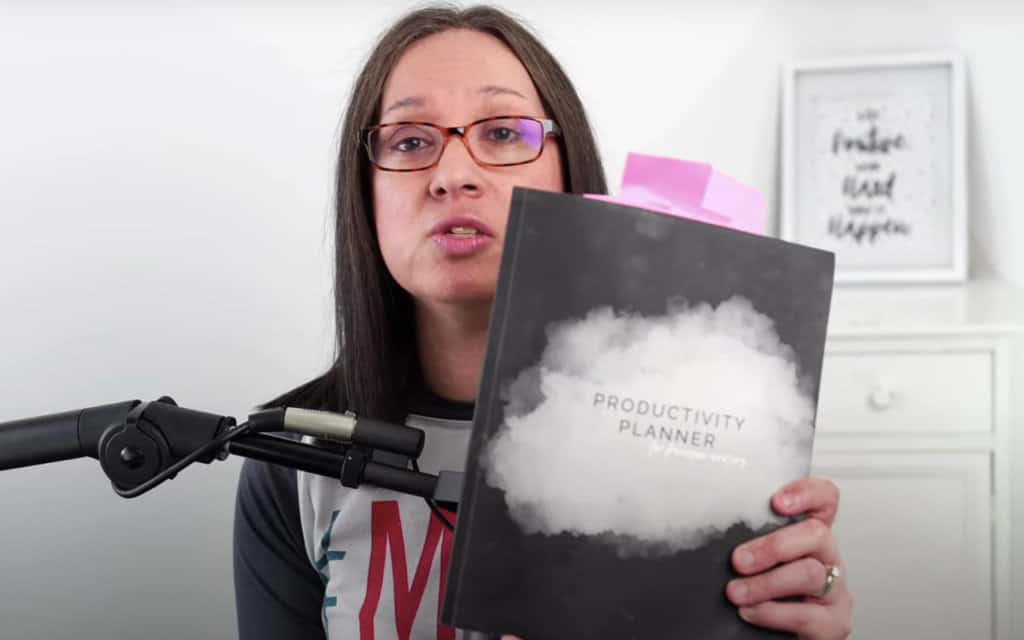
If paper isn’t your jam, you can go digital too.
I like using Trello and Notion, but there are other apps you can use.
They do take time to learn, but YouTube can help you with that!
Find a system that works for you and that you will use every day. If you don’t use it every day, it’s not the system for you.
Be Firm With Your Work Hours (to Balance Everything)
And lastly, be firm with the work hours you set.
In the beginning, I only worked when my twins were sleeping, which was mostly at night from 6 to 10 p.m.
I did not work when my twins were awake. As they grew older and started going to school, I adjusted my work hours to only be during school hours.
When they went to school, I worked, and when they came home, I stopped.
I also don’t work on the weekends as I’m focussed on family and house stuff.
By setting firm hours, you are working on creating a balance between work and family. This is hard for new freelancers because working for yourself doesn’t seem like work.
It’s fun, exciting, intense, and fulfilling!
So, of course, you want to have that feeling ALL day ALL THE TIME, but you can’t.
You will become overworked, irritable, and neglectful of your life, friends, and family.
So, take it from me and set those hours and honor them.
6. Negotiations
Another skill you need to succeed besides networking is the ability to negotiate a good rate for your writing service
This is a pain point for many new freelancers because some clients don’t value our writing or skill and will treat you unfairly.
That’s why it’s important to stand up for yourself, gain that confidence, and be able to negotiate a fair freelance writing rate.
I share in my program Write Your Way to Your First $1k how I negotiate my rate with a client because I know this is a challenge for many.
What I can say is be firm with your rate and justify it by the skill you have.
7. Accounting & Finance
Unlike traditional employment, where the employer often handles taxes and retirement contributions, we freelancers are responsible for our finances.
Look –
I’m not a lawyer (but one of my students is, and in the private course Facebook group, she did a Live to help us get our business in order), but it’s important to have a system in place for recording financial transactions and planning for tax payments.
If you need help as a beginner, pick up the book, The Money Guide for Freelance Writers by Alexis Grant of The Write Life.
My suggestions:
- Use accounting software (or hire an accountant)
- Set aside money for taxes
- Create a budget
Let’s break this down.
Use Accounting Software (or Hire an Accountant)
When you start as a freelance writer, you’ll want to sign up for accounting software to track your income and expenses, generate invoices, and provide financial reports.
Many accounting apps exist, but the most popular ones are Quickbooks and FreshBooks.
While using software can streamline your accounting, it might be a better decision for you to hire an accountant.
Since my husband also runs a business, we hired an accountant to handle and analyze our finances.
Or, if you hate doing your taxes like freelance writer Deevra Norling does, hiring an accountant is just a better option.
Set Aside Money for Taxes
Unlike traditional employees, freelancers are considered self-employed, meaning you’re responsible for paying both income and self-employment taxes.
To avoid being caught off guard by a large tax bill at the end of the year, start managing your money, by setting aside 25-30% of your earnings from client work.
I’m not an accountant so the 25-50% can vary based on your tax bracket and deductions. It’s better to overestimate and have a surplus than to underestimate and owe money.
Create a Budget
As always, create a budget and save your money because freelance writing income can fluctuate month to month.
This will help you manage your finances better.
So, set aside money for expenses, savings, and taxes.
This can help you avoid overspending and ensure you have enough money to cover your financial obligations.
8. Coordination with Clients
According to the study, 57% of freelancers work with multiple clients simultaneously while 47% work with only one client.
This looks like most freelancers prefer one or the other!
I enjoy having multiple clients, but the most I can have at one time is around three since I also manage other blogs and have several courses with students!
So, how do you coordinate everything with more than one client?
The best way is to use a planner to create client profiles.
In these client profiles, you can have:
- Contact info
- Payment info
- Rate
- Style guide
- Competitors
This can help you quickly figure out which client piece needs what style guide.
I would then batch my days according the clients or article topics.
It will probably take some trial and error to figure out how to coordinate multiple clients in a month.
Some freelance writers use Notion to build out their client calendars. If they have spots open, they find a client to fill them or ask a recurring client if they need more content.
I don’t do this as my calendar is already full of content creation for my brand, but if you do freelance writing, this method could also work.
9. Staying Productive
I can agree that staying productive is a HUGE challenge for freelancers.
It is for me.
When my plate is full, and my twins’ sports schedules are crazy, I will burn out and not be able to create content for my clients or for my brand.
It’s a real thing for us creatives and something non-creative husbands don’t understand.
But, I HAVE to take breaks to be MORE productive.
This fills my creative cup and gives me more energy to write.
You may not realize this but as a freelance writer, every client piece you write is like a freaking research paper!
You are writing several research papers per month…let that sink in.
So, it’s no wonder I NEED breaks throughout my day to regroup, re-energize, and just level out my emotions.
Another thing that helps me be more productive is consistently creating content.
I didn’t realize, but when I had weeks of no client work or weeks of not writing a blog post, it was extremely difficult to write 1,000 words.
It wasn’t until I was creating content every single day – filming a YouTube video, getting blog post ideas, writing a blog post, writing a LinkedIn post, writing an email – that creating that piece of content was a breeze.
So, even if you don’t have a full roster of clients to write for, create a writing routine for your business.
This might look like:
- Mondays: write a post on Medium
- Tuesday: send out 10 pitches
- Wednesday: write a LinkedIn and X post
- Thursday: write a sample blog post
- Friday: create a TikTok video or Instagram Reel
- Saturday: share photos on Instagram
- Sunday: outline a blog post
It might seem like a lot, but once you get into the habit of creating content, your job as a CONTENT WRITER will be much, much, easier!
Freelance Challenges No More!
I hope this post helped you see freelance writers’ challenges and how to overcome them.
It’s okay to struggle. I wouldn’t want to live in a world where everything came easy.
I would get bored and wonder, “why am I even here?”
Humans need a struggle to feel accomplished.
So, take those challenges, work with them, and use them as fuel to create a sustainable freelance writing business.
Over to you – what challenge is plaguing you right now?
Share them with me and we can come up with a plan!




Leave a Reply